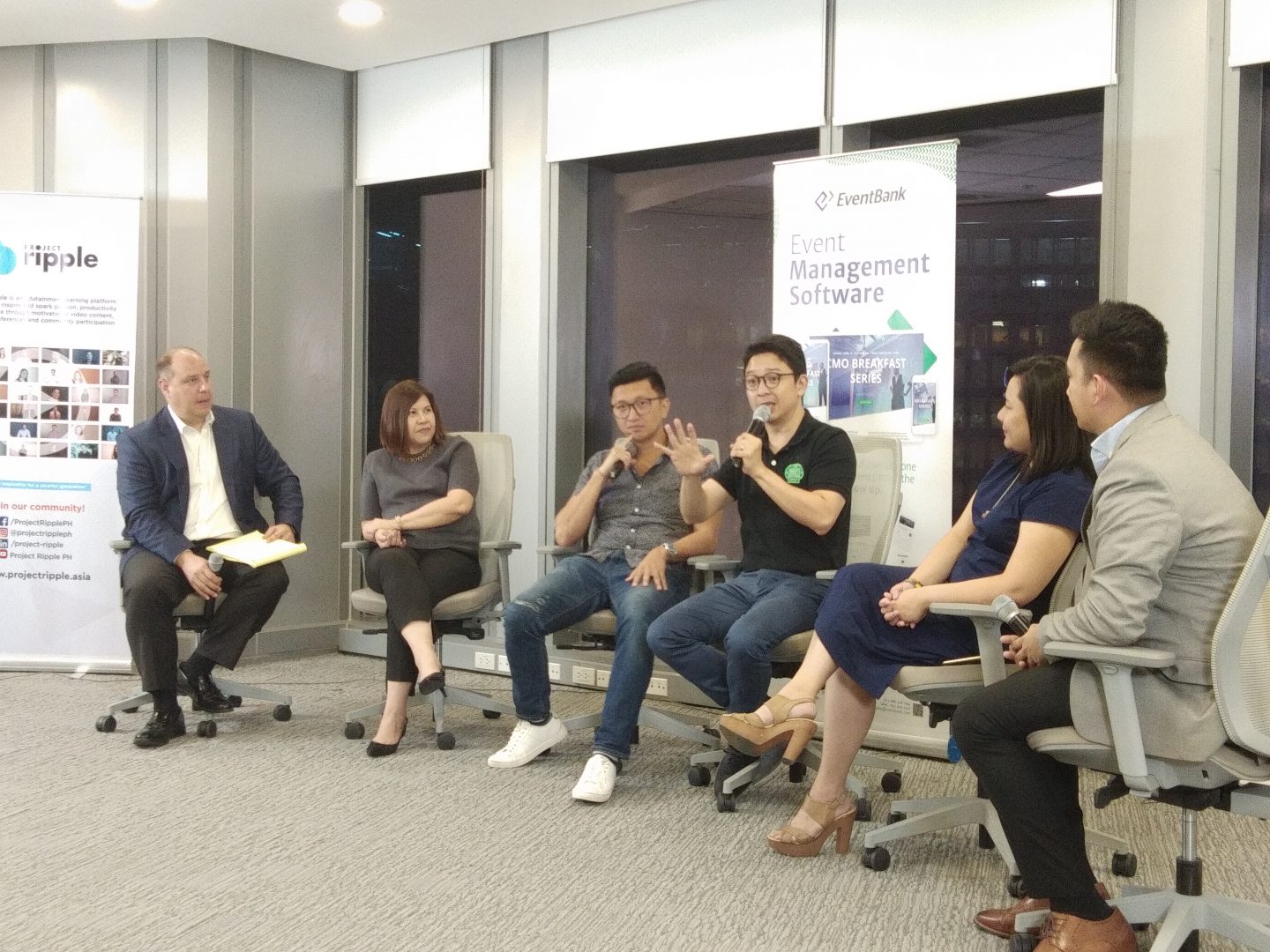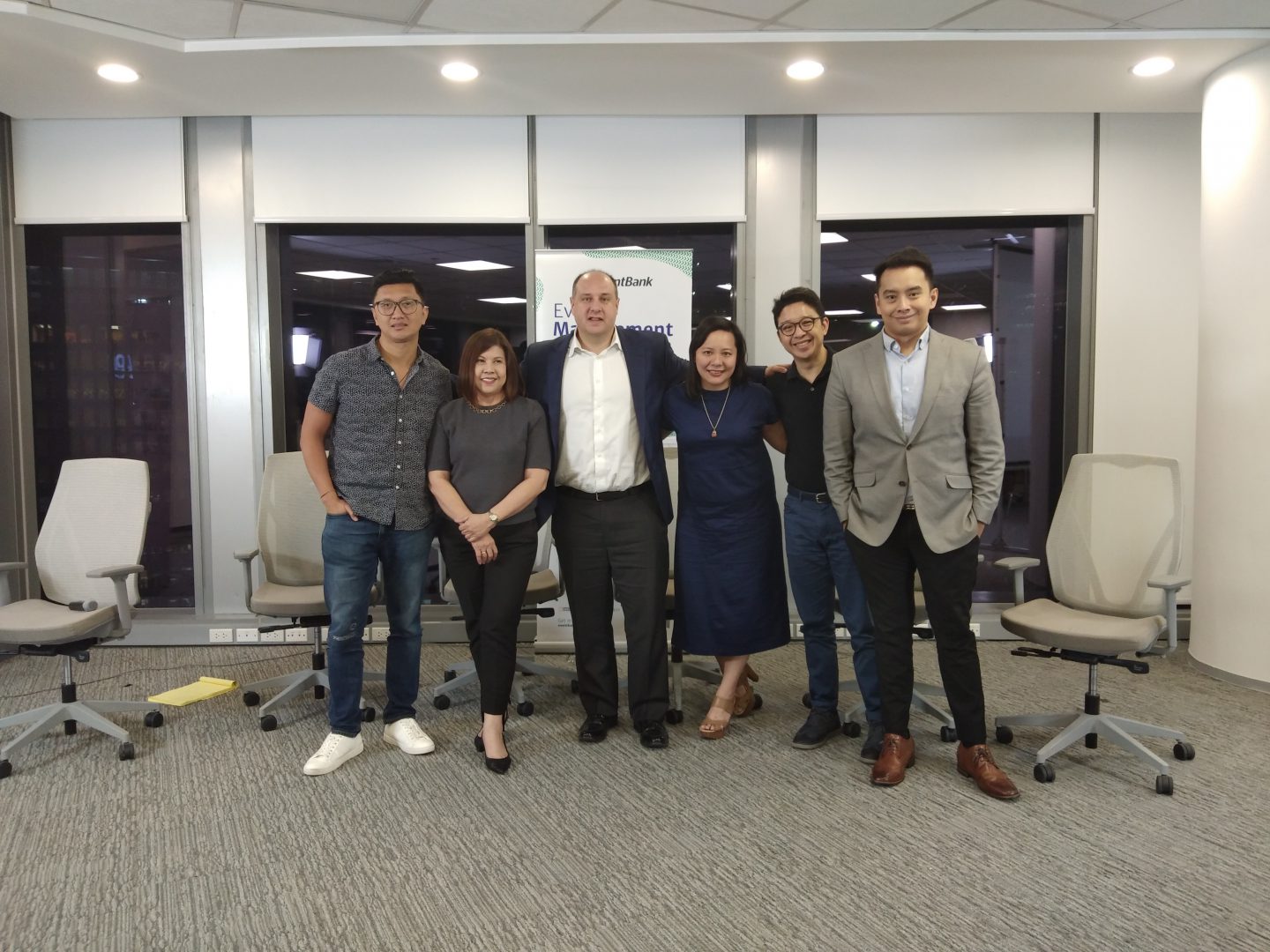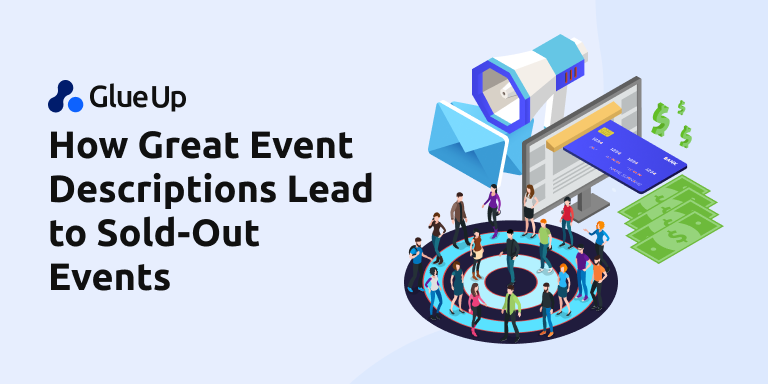
Glue Up hosted a panel discussion in Manila, Philippines to tackle the question 'how do you define event engagement?' on November 13th with 5 other panelists representing major brands and organizations from across the Philippines and Asia. In an opening talk about the role of event organizers and their respective organizations, Eric Schmidt, CEO of Glue Up, went on to explain that events are the bridge between sales and communities.
He also went on to show that without technology, the level of support and awareness an organizer has in an event capacity, is severely limited no matter the level of engagement had at the event. Event Engagement is just as much about the lead-up to the event, as it is the follow-up.
From then on the talk transformed into a panel discussion, introducing 5 guest panelists:
Luis Arcangel - Chairman and CEO of Montgomery, Fitch, and Associates
Gigi Bautista - Business Owner and Managing Direction of GBA Events Asia
Stephen Ku - CEO & Founder of Eventscape Manila
RJ Ledesma - Co-founder, Chairman, and VP of Business Development for Mercato Centrale Philippines
Kassy Pajarillo - Chief Encourager at the After Six Club
You can watch a video from the event recorded by our media partner Project Ripple.
Skip to the 43:30 mark for the panel introduction.
The Tough Questions
How do you Define Event Engagement & Successful Engagement?
Right out of the gates Eric Schmidt hits the panel with the hardest question to really answer with certainty. How does each panelist define engagement and thusly successful engagement at their respective events? With a mix of nervous sighs and nervous laughter, the audience, and panelists both anticipated some hotly debated topics brought up.
Kassy started off with the engagement point of Relevance, that no matter what the topic or medium at hand is if the event is relevant or not, the audience will dictate that the event was successful to you. If attendees come back in the future, if they don't leave early or leave bad feedback, or otherwise became so enthralled that they might share the event or invite others to join, then while this all can be considered engagement, the real indicator was indeed that the event a Relevant, therefore it was a success. So long as an event was Relevant, successful engagement is inevitable.
Stephen - Stephen jumps in with an allegory that events are “That Step before Marriage”, where the event's engagement can be summed up by how many conversions you can achieve on your end product, even if it's not the core of the event. An example he gives is that of an event he helped host for instant messaging company Viber, where indeed the attendees were there to drink and have fun, valuable feedback was given and so on. However, these engagements were engagements, but not the goal. The goal is to have users buzzing on Viber enough to purchase stickers, somewhat similar to emojis but more detailed and price driven. If tickets were not purchased in the end, then the event was a failure.
RJ - RJ approaches engagement with a more data-driven goal, what is the KPI of the event? Are you tracking conversions? How are you collecting data? Are you able to look through the data meaningfully and understand who attendees were, where did they come from? This data is valuable as it helps feed into your next event's pre and post-marketing. By learning from past events and your attendees, you can then use data to drive better engagement for more pliable KPIs in the future. He caps off his point by saying, go paperless and get off excel, what is the value added if you cannot use your data for more than just an email list?
GiGi- Gigi's approach is that the quality of the attendees is paramount to its engagement success. You could have 1000 people in a room but if they are not the right audience, then they're not going to convert or give back much value for you to use. 10 attendees in the same room where at least 1 converts are far better than the former.
Luis - Luis goes on to say that clients have different needs and different stages of business. In startups, people show up that's engaged, but more so on the company's success than about their product. For a startup, having a room full of people “that's engagement”. In corporate events, these have been doing more quality attendee approaches. KPIs get more specific, like the number of heads, how many people go to the booth, and who's converting?.
You need to give a hard guarantee for these sponsors as a corporate. This is the real challenge with sponsors as your event grows, the dynamics of the client is different for each event, but your sponsors will get more and more strict with your KPIs.
How many of your clients say they want quantity versus quality of attendees?

Stephen - Stephen jumped into this question head-on as his previous and first experience with Viber (see above) as well as a follow-up story. He starts off stating that it depends on the company and/or sponsor. Viber was at a stage where quality was not a priority, wherein the case of most startups, high headcounts meant engagement. But as Viber grew and encountered not only high KPIs from sponsors but also business challenges, their events now focused on higher quality attendees more than anything else.
So to answer the question, it's simply gray area. There is no way to say half of the sponsors want headcount, or half want quality attendees. This is usually up to the situation and stage of the hosting company. If anything, sponsors care only about the conversion and ROI, and sometimes they just don't care how it can be achieved in terms of KPI.
How have you taken what you learned from managing clubs into managing events?

This question was directed at Stephen, who had run clubs in the past before he turned to Event industry later in his career.
Stephen - His main point was that the key components of running a club are the same as for events. You need good influencers and an efficient User Journey. You need to feel like you're going through an experience, and influencers are the best at helping with that. The other point is that you need to have a clear and easy user journey for your attendees and that user journey starts online.
You need to have a smooth transition from advertising, promotion, and registration to make it easy to convey and convert potential attendees. The journey doesn't stop there, it then needs to continue to the end of the event, and even beyond. As much as 40% of conversions are missed due to failure to follow up with attendees who were there long after the event had ended.
How are you marketing events (as an agency)?
RJ - RJ chimes in with his idea that the future of event management is through utilizing multiple channels. Furthermore, the success of ROI is first based on budgets, and second, based on objectives. Channels used include Facebook for sure, but is really just targeting the 30+-year-old range as younger Gen Z and Y audiences have flocked to Tiktok, Instagram and Snapchat. Younger generations don't use Facebook as much, as they tend to stick to using Facebook messenger, which has lead to agencies turning to chatbots instead. Instagram can be used for cross-market for a more mature millennial audience.
Gigi - Gigi adds onto RJ's point saying that Ad agencies are going away. Everything has a KPI, so sticking to one channel is now going the way of the dinosaurs where agencies have to be ambidextrous when it comes to marketing methods and channels. When on-site, it's important to have an Event App, not just to help go paperless, but it's a seamless way to both capture and engages attendees. An example she gives is that of China, where WeChat is everything. All contact, sing in, and engagement is now done on WeChat, so the need to market both before, after and during is now the most important strategy in the modern era of events.
Luis - Luis then follows up RJ's comment further stating that there is no way you can get a client with legitimate KPIs using AD agencies. Clients are using centralized ads, so you need to harmonize everything into one organic campaign.
Stephen - Follows up Luis saying that “The agency of the future needs to specialize in Everything”, just like in the startup world. Another point he makes that stands out is that you need to make sure you are Mobile first. Stephen also recommends video content as it's highly engaging, and bandwidth around the world is getting faster and more readily available, so much so that video can be the main source of engagement before and after events.
Can you give an example of the greatest event you've seen that ever stood out?
For this final question, a hard-pressed answer was needed as there was much disagreement from the panelists about what really was their greatest event experienced. That was until RJ piped up with an amazing example of an event that pretty much used all lessons and indicators talked about during the entire panel.
RJ - In Dubai and Singapore, (Overseas Filipina Workers (otherwise known as OFW) have a lot of money earned from their work abroad, but they don't know how to get the money back home. Filipino entrepreneurs came to these areas and started a series of seminars to educate these workers on how best to finance their future. First, they did a set of financial literacy events. Then, they invited them to events where they can invest in products that helped them secure more financial independence. The engagement was nearly 100%. It built a community, and now its one of the fastest ROI makers in the finance sector's event space.
Cheers and Beers

As the panel wrapped up to applause, all guests then broke off into a series of beer, food, and networks, what better way to end an event? Audience members got a chance to have some personable one-on-one time with the panelists as well as Glue Up staff organizing the event.
There are more events to come in the days ahead as Glue Up expands homegrown events across the APAC region. Stay tuned on Facebook, Twitter, or LinkedIn to see if there's going to be an event near you!
Did the questions and answers from the event pique your interest? Contact us and we'll show you how to reach true engagement no matter what the KPI is, using our one of a kind engagement management platform.



